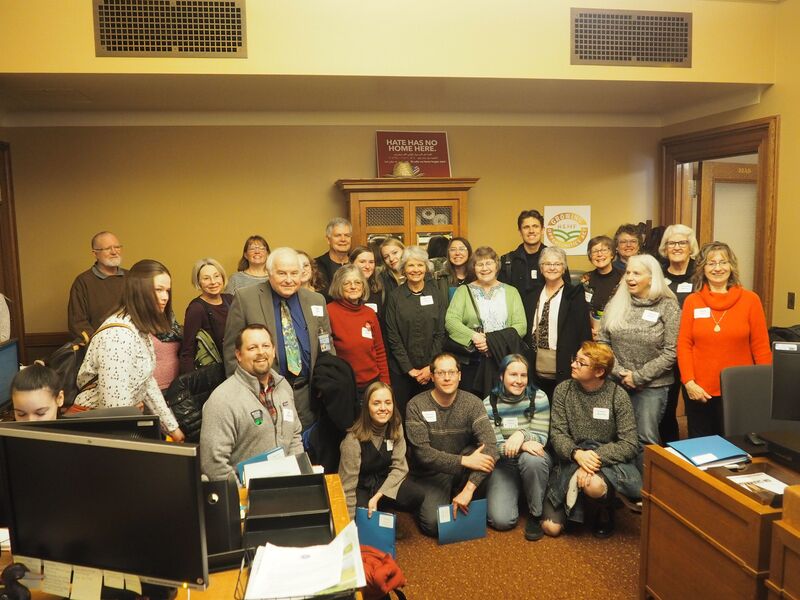Clean Water Legislation has been a major issue in the capitol this year. One effective model for people concerned with issues in our legislature is citizen lobbying. On Jan. 30 I took a trip with the citizen lobbyists from the Wisconsin League of Conservation Voters as they lobbied their legislators for better clean water laws.
A completely full bus of people traveled from Eau Claire and Tomah to Madison to meet with their legislators. We gathered together first to learn about the main goals of lobbying were this year, and to find out more about the issues. The lobbyists then broke out into groups by legislative district and developed their own strategy for who would speak to each issue and what personal stories would be told about the issues.
Unlike in some previous years, the citizen lobbyists concentrated on their senators, and citizens from each senate district met with their own senators. I went along with my own district to meet with State Senator Jeff Smith. This was an easy meeting since Smith has always been a reliable conservation voter in the legislature, both when he was in the Assembly and now that he is in the Senate. He agreed to support the bills as outlined by the lobbyists.
This year the particular bills that were considered a priority were:
- SCHOOL bills, SB423 and SB424, which require the testing of water in schools, daycare centers, and summer camps, and require providing alternative sources of water if the lead levels in the water exceed standards.
- Senate Bill 723, which funds an increase in county conservationists. This would make the county conservationist program almost fully funded. County Conservationists are crucial to farmers throughout the state, and particularly in working on groundwater testing and better management of manure and fertilizers in agriculture.
- The CLEAR Act, SB302, which would work toward reducing the concentration of PFAS chemicals throughout the state. Although there is already legislation passing through for the reduction of PFAS chemicals, the CLEAR Act would cover all of the PFAS chemicals and ensure a safer water supply.
- SB708 - The lobbyists asked their state senators to vote no on this bill. The bill would allow additional comment periods before standards for pollution are formulated. The regulation process is already slow, but the current process allows agencies to start formulating policy without lobbying by industry. The proposed law would let industry get a first crack at the process before it even starts.
After the citizens visited with their legislators, they retired to a local bar for drinks and appetizers before heading back on to the bus for the trip back to Eau Claire and Tomah. Those of us leaving from Eau Claire spent 12 hours in transit and working at the capital.
This is a brief account of the day. Sometime in the next week, we'll release our first podcast episode in which we will talk with the participants about their experience, and what it is like to be a citizen lobbyist. The four information sheets on the bills that were being lobbied are attached to this story.
Memberships
Wednesday is Citizen Conservation Lobby Day in Madison
Be a Citizen Conservation Lobbyist in Madison Wednesday
Wednesday, February 21st is Conservation Lobby Day 2007 - - the date on which conservationists will gather to button-hole legislators at the State Capitol and talk to them about pressing Wisconsin environmental issues.
Power plant siting. Ground and surface water protections. Wildlife habitat and wetlands preservation. And more.
On all the other days, big-shot lobbyists with bigger-dollar clients will have their routine policy and legislative way with representatives and senators, but Wednesday is when you can organize with like-minded Wisconsinites make a direct impact.
The Wisconsin League of Conservation Voters is one of the groups that is helping organize this event: check out the details here and get involved.
Steve is a member of LION Publishers , the Wisconsin Newspaper Association, the Menomonie Area Chamber of Commerce, the Online News Association, and the Local Media Consortium, and is active in Health Dunn Right.
He has been a computer guy most of his life but has published a political blog, a discussion website, and now Eye On Dunn County.



Add new comment